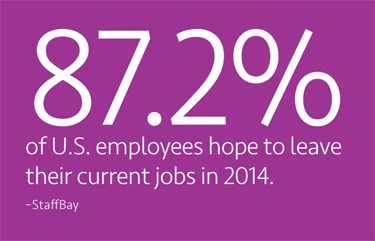The research is in—professionals, employees and job seekers are unhappy.
Well, that’s certainly the case if you believe StaffBay’s survey of 15,000 employed professionals. According to the study, 87.2% of employees hope to leave their jobs in 2014. When asked why, 52.6% said it is because they do not trust those in charge.

Quantum Workplace’s 2013 Employee Engagement Trends Report emphasizes this trend. According to the survey, trust in senior leaders has the greatest impact on organizations’ overall level of engagement. It would make sense, then, that employees want to leave if they harbor bad feelings about those in charge.
When employees quit, job-hop or change careers, we often point to compensation. Financial gain will always have a place at the top of the list, but is trouble with senior leaders truly to blame? If not, who or what are the true culprits of voluntary turnover?
Without further ado, this week’s Talent Acquisition Fast Facts:
Of the more than 100 million people in the U.S. who hold full-time jobs, only 30% are engaged and inspired at work; roughly 20% are actively disengaged—according to Gallup, State of the American Workplace: Employer Engagement Insights for U.S. Business Leaders.
Although turnover has remained steady at approximately 1.7% per month over the past 10 years, the number of employees voluntarily quitting has continued to grow—in fact, according to the Bureau of Labor Statistics, approximately 2,000,000 Americans quit their jobs every month.
Business Insider surveyed 225 U.S. executives to find out why they choose to leave an employer. Interestingly, 22% cite the desire to launch their own companies—primarily because of issues with senior leadership and to run an organization/culture their own way.
- Further emphasizing this, according to research conducted by Career Outcomes Matter, the biggest reason employees quit has to do with losing trust in corporations.
- Further, according to a March online survey conducted by CreativeLive, 40% of more than 1,120 employed professionals who want to quit their jobs—the No. 1 reason is to leave corporate America.
The research suggests corporate employees are ultimately looking for a better working environment. Understanding the importance of talent, what can/should larger organizations do to avoid such active disengagement? Can troubles really be attributed to senior leadership, or is it by default employee blame those at the top for the professional unhappiness.
When an employee leaves for another job, many believe compensation is the deciding factor. However, research by PwC tells a different story; PwC conducted more than 19,000 exit interviews for current clients and found the top 10 reasons employees quit:
1.) Limited career/promotion opportunities (16%)
2.) Supervisor lacked respect/support (13%)
3.) Compensation (12%)
4.) Job duties are boring/no challenge (11%)
5.) Supervisor lacked leadership skills (9%)
6.) Work hours (6%)
7.) Unavoidable reasons (5%)
8.) Supervisor poor employee relations (4%)
9.) Supervisor displayed favoritism (4%)
10.)Not recognized for contributions (4%)
One can argue that five of these 10 reasons are attributed to an active dislike for leadership. While compensation does rank in the top three, nearly 6,500 of the 19,000 surveyed professionals said their act of quitting was directly related to problems with leadership.
U.S. businesses alone lose $11 billion annually as a result of employee turnover and the numbers above highlight many still struggle to hold on to their talent. Is this truly a problem, or can number be manipulated to make us believe something not entirely true? What retention strategies have worked best for your organization? The research above indicates the problem starts with ineffective leadership, but do you believe this is accurate? Are the numbers telling the whole story?
We’d love to hear your thoughts!
